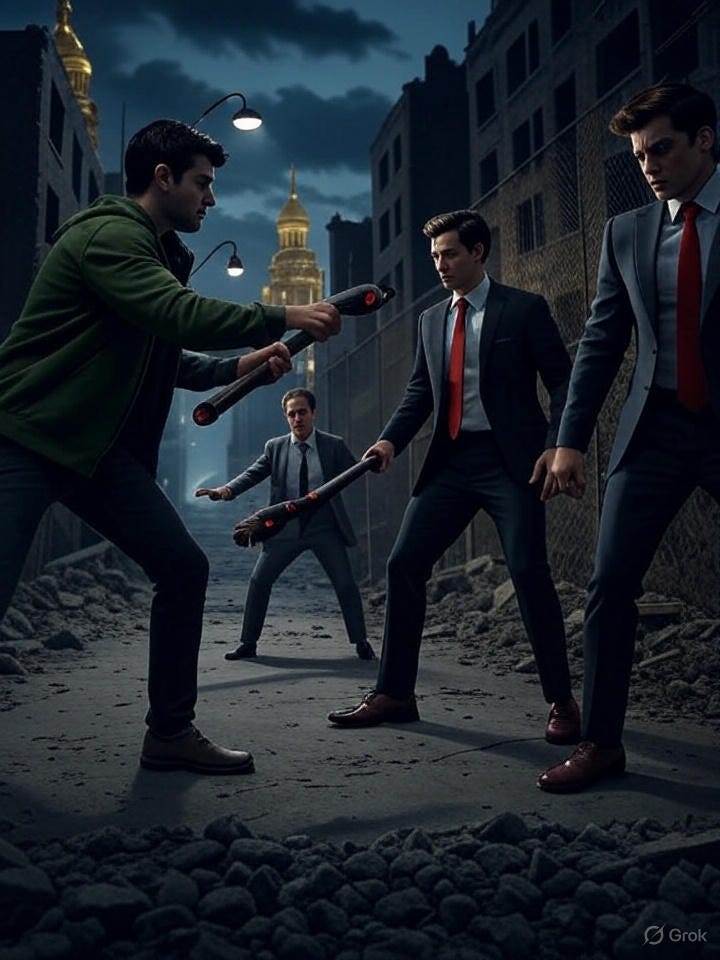Sam’s Switchblade Diplomacy
When the Unusual Becomes Common
Sam’s Switchblade Diplomacy
When the Unusual Becomes Common
By Jim Reynolds – www.reynolds.com
The city ain’t what it was.
Windows busted out with no intention of ever being fixed.
Graffiti names the power structure better than any voting booth ever did.
There’s smoke where there used to be sky.
And four corners where it always goes bad.
Corner One: Z’s turf.
Cracked concrete. Chain-link pride.
It’s not much, but it’s his. He lives it, bleeds it. Keeps the rats back with busted batons and pure nerve.
But Red keeps coming.
Corner Two: That’s Red.
Old blood. Big crew. Big ego. Thinks the past was a deed.
He sends waves of muscle and misery down Z’s way like clockwork, trying to peel off a block at a time.
History? Please. This is hunger.
Z fights back, outnumbered but not outhearted.
Problem is, heart doesn’t come with ammo.
So he drags his battered self down the avenue to Edward.
Corner Three: Edward’s turf.
Used to be nice. Now it’s a fading mural and a nervous twitch.
Edward’s turf wasn’t what it used to be. For years, his neighborhood had become a patchwork of outsiders—some invited, some not—each with their own loyalties, needs, and noise. That made managing his corner complicated. He couldn’t fix his own fences without ten committees weighing in. Couldn’t patrol the block without someone crying foul. Every time he tried to flex, he pulled a muscle. And that’s what made him jittery about Red moving in next door.
Edward knows if Z falls, Red gets a direct line to his stoop.
But Edward’s been sleeping on the job—his defenses are all rust and optimism.
He’s been relying on Sam.
See, for some long-forgotten reason—some postwar promise scribbled in crayon on an old napkin—Sam’s turf across town has always carried a badge and a billy club for Edward’s block.
Don’t ask why. Just know the deal’s been running on fumes.
And now Sam’s had enough.
Corner Four: Sam.
Runs his precinct like a clean ledger.
Doesn’t need this war. Doesn’t owe these people.
But what Sam does have is the factories.
Zipguns, molotovs, laser sights, night knives.
He supplies the whole damned city with what it uses to hurt itself.
The old bosses of Sam’s zone?
They gave gear to Z for free.
Z got weapons.
The factories got rich.
Sam’s people got the invoice.
Sam called it what it was: sucker business.
So now Sam flips the board.
Tells Edward: “You wanna be safe? Time to spend like you mean it.”
Edward caves—scared enough to budget up, scared enough to shop.
And oh, what a shopping spree it is.
The factories hum. The orders fly.
But here’s the twist…
Edward’s buying, but not just for himself.
Sam set it up so Edward’s brand-new gear “accidentally” lands in Z’s alleyway.
Sam doesn’t look like a sucker.
Z gets what he needs.
Edward keeps his buffer zone.
And the weapon boys get paid full freight.
It’s a masterpiece of back-alley diplomacy.
And just when you think that’s the whole play—just when the smoke starts to lift—someone asks the real question:
“Wait… wasn’t Sam the guy who first tried to get Red and Z to make peace?”
Yeah. He was.
He called a sit-down. Tried to go Godfather.
Red showed up, smiled, and pissed on the offer.
Didn’t take him seriously.
Big mistake.
Because that’s when Sam became the architect of this whole shadow deal.
It was never about goodwill.
It was about leverage.
About who pays, why they pay, and what they think they’re getting.
In the final scene, Sam walks away clean.
Z is alive.
Edward’s beefed up.
The factories roar.
And Red?
Red realizes the city just moved under his feet—because the guy across town just outplayed him.
Like that…
poof… the sucker became the genius.
Postscript Grook
Sam’s Switchblade Gambit
In alleys dark where shadows scheme,
Z fights Red’s horde with desperate dream.
Edward frets, his fences thin,
While Sam’s across, plotting to win.
No free blades for the sucker’s play,
He rattles cans, makes Edward pay.
Gear flows east on leverage’s tide,
Outfoxing Red—genius applied.



